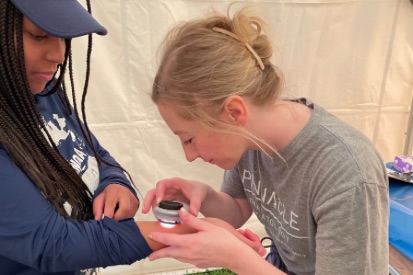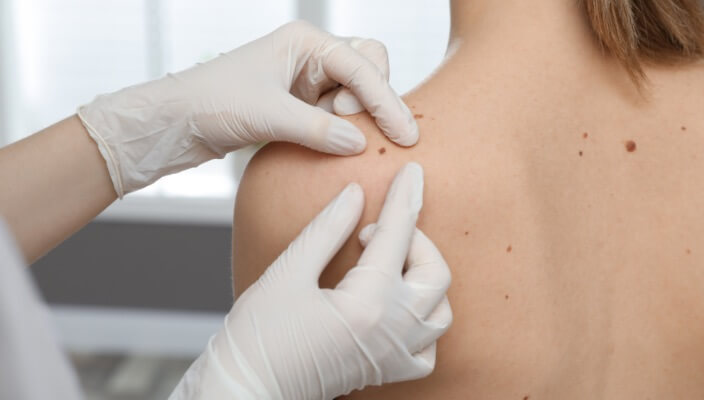Skin Cancer Prevention
Five Ways to Prevent Skin Cancer

Don’t become another cancer statistic. Skin cancer is easily preventable and if detected early, is highly treatable. The five-year survival rate for melanoma, the most serious form of skin cancer, is 99% if detected and treated before it spreads to the lymph nodes.
One in five Americans will develop skin cancer by the age of 70. Rates of all skin cancers are increasing, including basal cell carcinoma, squamous cell carcinoma, and melanoma. Our mission is to educate you, our valued patients, on minimizing risks and keeping your skin healthy.
Early detection is key. Examine your skin monthly to become familiar with your moles and freckles. See your dermatologist if you notice a spot or mole that is new or different.
Learn the Risk Factors
Regardless of age, background and skin color, anyone can get skin cancer, but people with certain conditions are at greater risk:
- Blistering sunburns during childhood or adolescence
- Skin burns or freckles easily
- Excessive sun exposure
- History of using tanning beds
- Having numerous, atypical, and/or large moles
- Personal or family history of skin cancer
- Suppressed immune system
Protect your Skin, Stay Ahead of Skin Cancer
The leading cause of skin cancer is excessive exposure to ultraviolet rays from the sun or artificial sources like tanning beds. Here are simple yet effective ways you can prevent skin cancer:
- Apply a broad-spectrum (UVA/UVB) sunscreen with an SPF of 30 or higher daily, even on cloudy days. Visit Shop.PinnacleSkin.com to view sun protectants for every need.
- Apply one ounce (two tablespoons) of sunscreen to your entire body 15-30 minutes before going outside. Reapply every two hours or after swimming and sweating.
- Practice sun safety: wear a wide-brimmed hat, (UVA/UVB) sunglasses and sun-protective clothing, and seek shade from 10 a.m. to 2 p.m.
- Avoid tanning and never use tanning beds, which cause skin damage and an increased risk of skin cancer.
- Perform monthly skin self-exams to check for new moles or areas that are changing, itching or bleeding. If you see something that concerns you, have it checked by your dermatology provider even if it’s not time for your annual skin exam.
Tips and Tricks: Skin Cancer Prevention
Have a Full-Body Professional Skin Exam
Get screened for skin cancer annually (more often if you are at risk) with a Total Body Skin Exam. We will examine the entire surface of your skin and note issues that require monitoring or closer examination. Skin cancers occasionally resemble seemingly normal skin or benign conditions like warts, scars or pimples, so having an expert look for subtle signs brings peace of mind. Schedule your annual exam today.

Schedule Your Skin Check at Pinnacle
Find a location nearest you and scheduling online today.
Featured Products for Sun Protection
Check your local office for current stock!
Check your local office for current stock!
Featured Blogs

- Skin Cancer
- General Dermatology
- Skin Exams
Your skin is your largest organ and its first line of defense. Learn more about why a skin exam should be a part of your wellness routine.
Read More
- Skin Cancer
- Sun Safety
The sun's ultraviolet (UV) radiation poses a significant risk. Discover ways to protect you and your loved ones from the sun and keep your skin healthy all year long.
Read More
- Skin Cancer
- General Dermatology
- Skin Exams
Learn the ABCDEs of Melanoma, the deadliest form of skin cancer.
Read More


